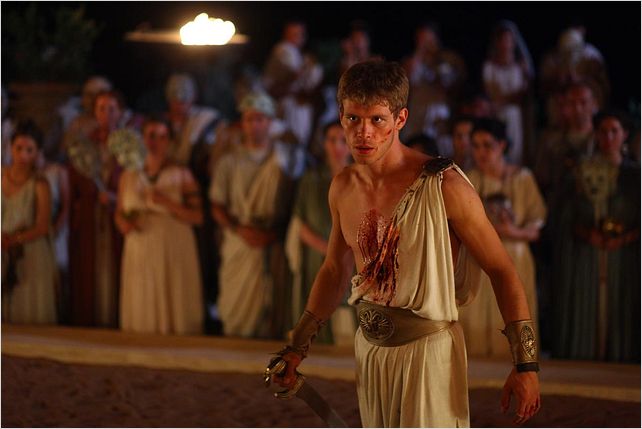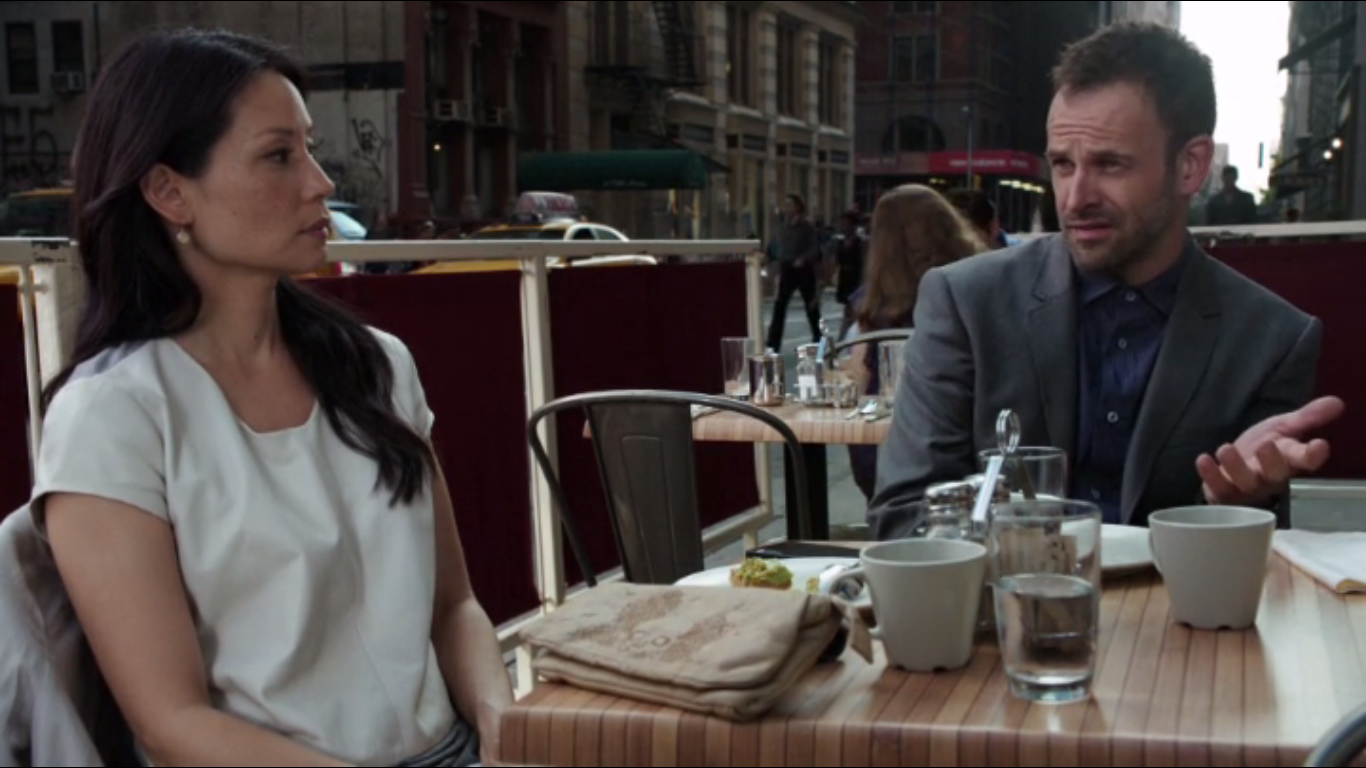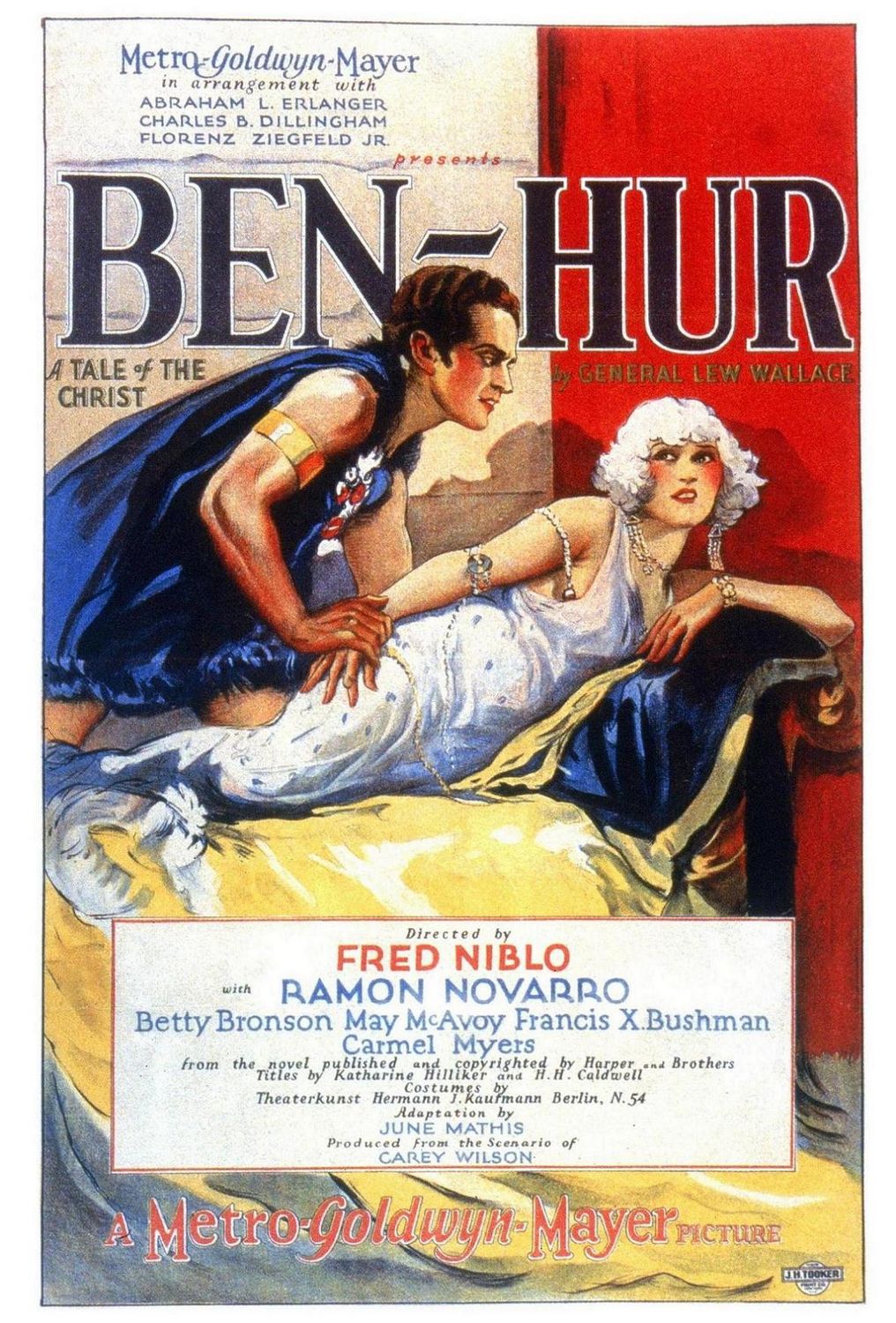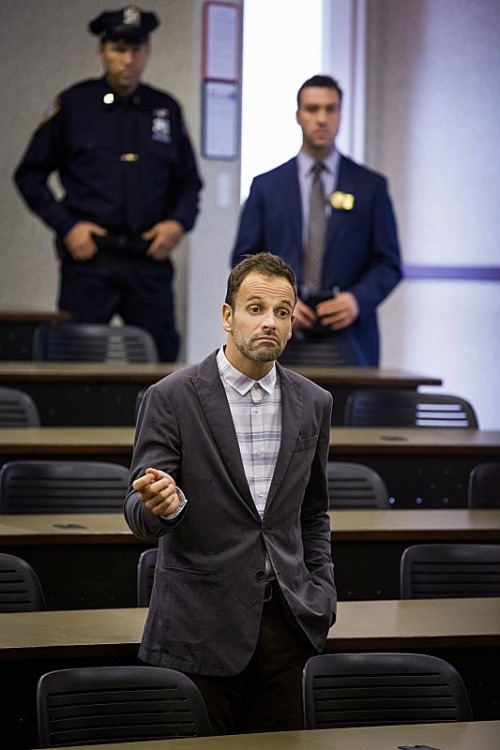BEN-HUR (2010)
Judah: Blood and Sand...
It is so hard to make a new version of an established classic. You deal with people's memories and emotions upon seeing a new film version of something that was made by craftsmen in front and behind the camera in an earlier time. There is a reason why such films as
Gone With the Wind or
Lawrence of Arabia have not been remade (apart from a prohibitive cost...and the television sequel to the former,
Scarlett, does not count). The films were so good: the acting, the directing, the story, that to do them again seems to make a mockery of both original and remake.
Ben-Hur, apparently, is another story.
If one is picky about things, we can point out that
the 1959 version of Lew Wallace's
Ben-Hur: A Tale of the Christ is technically a remake of
the 1925 original. I think both the Ramon Novarro and Charlton Heston versions of
Ben-Hur are absolute masterpieces: thrilling, intelligent, respectful of the author's Judeo-Christian worldview (and both have astonishing chariot races, among the most spectacular and intense sequences in all film). For many, the Heston version of
Ben-Hur is
THE version, never to be equaled again. Certainly it is the better-known version of the
Tale of the Christ, and the idea of there being another remake is almost blasphemous.
That having been said, we now find that there indeed HAS BEEN yet another version of General Wallace's massive epic novel of a Jewish prince-turned-slave-turned-Roman-turned-charioteer-turned-Christian and his fierce rivalry with Rome and his once-friend, the Roman Messala. However, the 2010 television miniseries adaptation of
Ben-Hur, as far as I know, never aired in the United States. It was a product of the Canadian Broadcast Corporation (CBC) and only now is available on DVD. Given the popularity and acclaim of both the 1925 and especially the 1959 version (it was the first and one of only three films to win a record-setting 11 Academy Awards, a record tied only by
Titanic and
The Lord of the Rings: The Return of the King), tackling a new version of
Ben-Hur is daunting to say the least. Even with the added advantages of both a longer playing time as well as the popularity of historic epics ranging from contemporary television series like
Rome and
Spartacus to
The Borgias and
Da Vinci's Demons down to
Downton Abbey, we are talking about
Ben-Hur, one of the most iconic movies in history. The television version of
Ben-Hur, while entertaining on its own, will never challenge either film version as
THE Ben-Hur.
Judah Ben-Hur (Joseph Morgan) and Messala (Stephen Campbell Moore) have been lifelong friends. The son of a Jewish merchant and the bastard son of a high Roman general love to race chariots in Jerusalem, ever since they were children (Eugene Simon and Toby Marlow as Judah & Messala respectively). Messala is recalled to Rome to learn the ways of the conquerors, upsetting Judah and his family, mother Ruth (Alex Kingston) and sister Tirzah (Kristin Kreuk).
Many years pass, and Messala, now a major Roman officer, returns to his old haunts with Pontius Pilate (Hugh Bonneville). Judah in the interim has grown wealthier, but because he deals with Rome he is seen as a collaborator at best, traitor at worst. Judah is merely trying to keep a delicate balance. Messala wants Judah to serve as informer, but Judah won't. A fortuitous accident with Judah knocking some tile down on Pontius is excuse enough for Messala to send the Hur family to prison, with Judah sent off to the galleys. Here, he meets Quintus Arrius (Ray Winstone), a powerful military leader. In a sea battle Arrius and Judah survive thanks to the Jewish slave, and the grateful Arrius takes Judah under his wing: if memory serves correct adopting him after training him to be a gladiator.
That's right: Judah trains in gladiatorial sport.
Judah, now Sextus Arrius, grows in strength and beauty. His skills as
Gladiator attract much attention: from Marcellus (James Faulkner), a friend of Quintus and confidant to Emperor Tiberius (Ben Cross), from the Emperor himself, and from Athene (Lucia Jimenez), Marcellus' mistress/ prostitute. It helps that Marcellus just happens to be Messala's father, who only now is beginning to recognize his son in every way. The Greek whore is powerfully attracted to the Jewish kid, and they begin an affair. Tiberius wishes to be entertained, and Sextus fights to the death, but when his opponent refuses to kill Judah and instead attacks Tiberius, the Emperor, filled with rage, demands Quintus make amends. With that, Quintus takes 'the pink bath', and with his father figure gone, Sextus now goes to Jerusalem to settle old scores.

Neither Marcellus or Pontius are aware of Judah's true identity, though I'm not sure on Athene. Judah now has a chance for revenge, thanks to Sheik Ilderim (Art Malik), who needs a driver for his chariots in a race. Esther, who now has taken refuge with the zealot David Ben-Levi (Marc Warren), an old business associate of Judah's, sees the folly of revenge, but Judah will not be dissuaded. With the Sheik's patronage, the Jew will race the Roman to a battle to the death.
In case you were curious, Ben-Hur wins the race, managing to run over his once-friend in the process. A crumpled and defeated Messala waits for Judah, while Pontius Pilate has the matter of an obnoxious Jewish carpenter to deal with. As Jesus (Julian Casey) is led to Calvary, He tells Judah to 'forgive them, for they know not what they do.' Judah and Messala reconcile at the end as the Roman's life slips away as result of his wounds. Marcellus, still upset at his bastard son and having to pay a fortune to Sheik Ilderim, can only look upon his illegitimate child with disgust, but Athene, mistress of poisons, has one last gift for her Roman master. Judah and Esther are united at last and all is well.
One particularly shocking aspect of
Ben-Hur (out of many) is summed up by the advertisement:
Rome made him a slave. Revenge set him free (emphasis mine). Those behind
Ben-Hur appeared to miss the entire point of the novel: forgiveness of oneself and of those who did evil to them through Christ, is what 'set him free'. The story hinges on the idea that at the end, Judah accepts that vengeance will not bring peace but the ideas of Jesus (loving your enemy, forgiving those who do you harm) and Christ Himself will.
Ben-Hur, on the other hand, holds that Judah is liberated by seeing his rival vanquished (as well as getting a lot of action on the side). Granted, that at the end Christ's words are the trigger to having Judah go to a dying Messala, but it's curious that Messala asks for forgiveness rather than Judah offering it.
I think it has to do with the fact that
Ben-Hur is more interested in copying such programs like Starz's
Spartacus than in staying within the source material.
Spartacus in many ways is almost gloriously over-the-top in its sex and violence, where that was a selling point.
Ben-Hur has plenty of sex and violence, but somehow they seem to be a bit out of place. I still don't know whether the line, "I didn't expect virginity along with virility, but I am honored to receive it," was meant to be cheesy or just came off as unintentionally hilarious. However, with Athene's breasts popping out all over and the show's every effort to showcase Ben Morgan's beautiful form we get a lot of nudity.
Here is another element where
Ben-Hur looks more like a pilot for a pay network than something for general audiences. There is a great deal of sex and violence in
Ben-Hur. That in an of itself isn't particularly shocking. What does shock is how much we get of both that sex and violence. In regards to sex we get some strange turns. While there has been a homosexual suggestion in the 1959 version (thanks to uncredited screenwriter Gore Vidal, who insists he put a gay subtext between Charlton Heston's Judah and Stephen Boyd's Messala), here we get the two of them in a bath as well as talk of a "Greek affliction" (whatever
that meant).
In regards to the violence we get a spectacular number when Judah is in a gladiatorial fight for Tiberius pleasure. While we don't get a lot of blood and gore (minus the fact that we do think this is a lost scene from something out of Spartacus the television show) the comparisons to the Kirk Douglas Spartacus is impossible to miss. ANYONE who has seen the Stanley Kubrick epic will recognize the scene, right down to how it ends. It was almost embarrassing to watch.
In short, there is simply too much focus on the physical beauty of Ben Morgan and the violent clashes between Morgan and Messala's Stephen Campbell Moore than there is in the actual story (which has been wildly altered from anything anyone who saw either version remembers).
Of all things that
Ben-Hur either ditches or alters, it is the figure of Christ that is the most scandalous. In every adaptation of
Ben-Hur, the Christ character is there, but always a bit hidden. The stage play had Christ appear as a shaft of pure white light. In both film adaptations, we never see or hear Christ: He is shown as only a pair of hands in the 1925 version, or we see His back or shadow or in long shot where His face was obscured. In the television version of
Ben-Hur, we not only SEE Him but HEAR Him too! In a total break with all tradition, the Christ character appears before us, and the fact that in truth Jesus had NO role in
Ben-Hur: A Tale of the Christ makes His appearance even more bizarre. Putting the topper on this ghastly decision in Alan Sharp's adaption is to give Christ as virtually His only line of dialogue, "Forgive them, for they know not what they do," on both occasions when they meet.
Talk about taking the Lord's words out of context!
 |
Hello, Sweetie!
If you weren't my son... |
Turning to the performances I can't say that Joseph Morgan is a good actor. He has a fine form (which
Ben-Hur does its best to feature), but this Judah seems to be all glum and grouchy (even when things are going well for him). Scowling his way through the film, about the only time Morgan shows even a hint of human emotion is when he sees the Sheik's horses (and that's near the end of Episode Two of the two-episode film). Moore was much better as the bitter bastard son and Judah's rival, for at least he had a motivation in his actions.
Allow me now to be generous. Longtime readers know how I feel about both Alex Kingston and the character she plays on
Doctor Who: River Song (a vile piece of ...). However, in
Ben-Hur she did a good job as Ruth, Judah's mother, caring for both her 'boys' (even if she, like Kristin Kreuk's Tirzah was underused in the story). However, allow me also to point out a few things.
Alex Kingston: born March 11, 1963 (Age: 50)
Joseph Morgan: born May 16, 1981 (Age: 32)
Matt Smith: born October 28, 1982 (Age: 30)
In
Ben-Hur, Kingston plays the MOTHER to a man 18 years her junior.
On
Doctor Who, Kingston plays the LOVER to a man 20 years her junior.
I'd like all the Riveristas, those who insist the River/Doctor story is this great love story, to remember that in real life, River is old enough to be the Doctor's MOTHER. There's an odd, even grotesque incestuous feel whenever I watch Kingston and Smith together or when I'm asked to believe this 'The Doctor's One True Love' nonsense (as if believing the Doctor would be passionately in love with such a murderous narcissist like River Song when he could have had Romana, Leela, Jo Grant, or Sarah Jane Smith among others wasn't already nonsense in and of itself).
Sorry, but any chance I get to trash River Song, you bet I'll take it. Yet I digress.
I thought well of Ben Cross' Tiberius, though here
Ben-Hur seemed to have lost its way and slipped into
Gladiator territory. Perhaps this was part of the overall problem with
Ben-Hur: too much focus on the sword and sand spectacle to give much thought to the actions and motivations of the characters.
Moving on to other aspects, if anyone expects the chariot race between Judah and Messala to be 'epic', be in for a disappointment. I'll cut it some slack in that this is made-for-television, but it was not the chariot race we're used to (going around in circles), but a literal race from Point A to Point B. The sea battle was well-made, though the CGI was pretty obvious too. We also have the issue of taking too much time away to feature lots of skin, some blood, and situations that seem to come from another story altogether (Arrius' suicide, Athene's forced and not-so-forced bed hopping, for she also sleeps with Messala as well as his father and Judah) and hardly any focus on other things.
It may be the familiarity to other stories (
Spartacus the film and television series primarily) that damns
Ben-Hur from achieving greatness, let alone equal pairing with its more famous predecessors. It wasn't terrible, and if one likes to see lots of sex and violence (with a little bit of Jesus in there),
Ben-Hur might be worth the time. However, perhaps the fact that it could have been more is what disappointed me in the long run.
Sorry, Joe. I'll take Chuck anytime, no matter how pretty you are (except for your face, which seems to have this perpetual scowl)...
The General would not approve.
4/10
 |
She's 50.
He's 30...
and younger than her TV son.
Just a thought. |




















.jpg)













